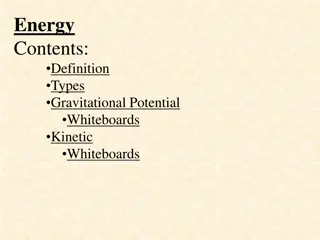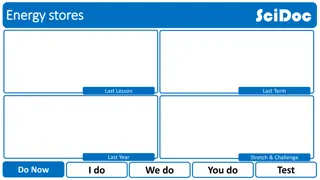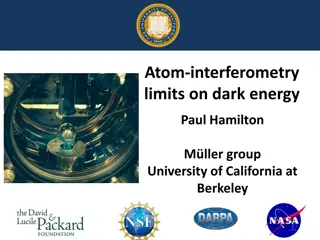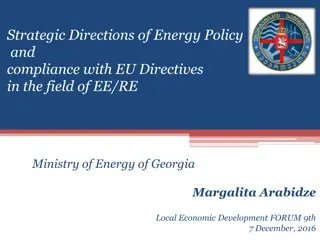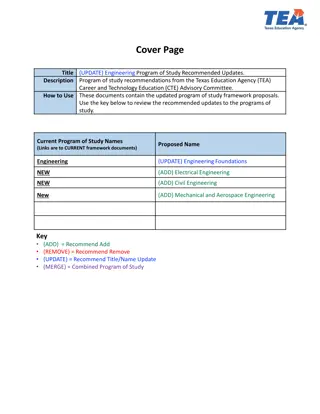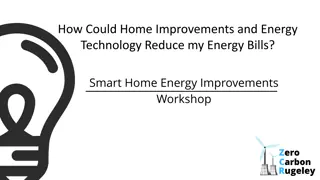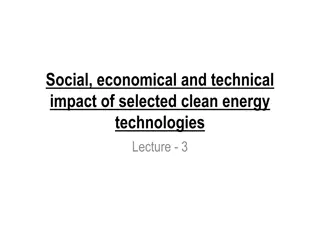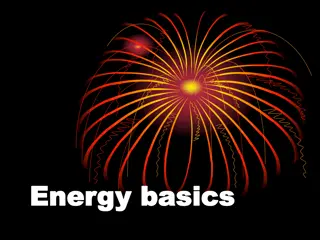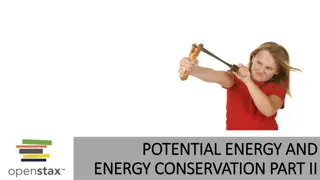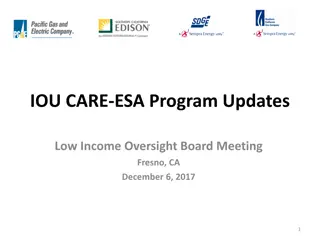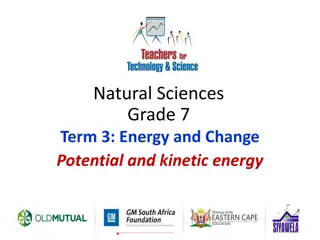Recommended Updates to Energy Program of Study Framework
Texas Education Agency along with Career and Technology Education Advisory Committee recommends updates to the program of study framework for Energy Career Cluster. The proposals include adding a Renewable Energy program, suggested changes to existing programs like Oil and Gas Exploration and Production, and Refining and Chemical Processes. Secondary courses, advanced academics, and postsecondary opportunities are detailed for each program, aiming to prepare individuals for careers in the energy industry.
Download Presentation

Please find below an Image/Link to download the presentation.
The content on the website is provided AS IS for your information and personal use only. It may not be sold, licensed, or shared on other websites without obtaining consent from the author.If you encounter any issues during the download, it is possible that the publisher has removed the file from their server.
You are allowed to download the files provided on this website for personal or commercial use, subject to the condition that they are used lawfully. All files are the property of their respective owners.
The content on the website is provided AS IS for your information and personal use only. It may not be sold, licensed, or shared on other websites without obtaining consent from the author.
E N D
Presentation Transcript
Cover Page Title Energy Program of Study Recommended Updates. Program of study recommendations from the Texas Education Agency (TEA) Career and Technology Education (CTE) Advisory Committee. These documents contain the updated program of study framework proposals. Use the key below to review the recommended proposals to the programs of study. Description How to Use Current Program of Study Names (Links are to CURRENT framework documents) Proposed Name Oil and Gas Exploration and Production No Update Refining and Chemical Processes No Update Renewable Energy (ADD) Moved from STEM Key (ADD) = Recommend Add (REMOVE) = Recommend Remove (UPDATE) = Recommend Title/Name Update (MERGE) = Combined Program of Study
Energy The Energy Career Cluster prepares individuals for careers in the designing, (ADD) processing, planning, maintaining, generating, transmission, and distribution of traditional and alternative energy. Oil and Gas Exploration and Production Statewide Program of Study The Oil and Gas Exploration and Production program of study focuses on processing, refining, and distributing petroleum and gas. It introduces CTE learners to the process of regulating the flow of oil into pipelines, controlling pumping systems, and operating and maintaining machinery to generate electric power. Secondary Courses for High School Credit Level 1 Oil and Gas Production I/Lab Foundations of Energy Level 2 Oil and Gas Production II/Lab Occupational Safety and Environmental Technology I Level 3 Oil and Gas Production III Occupational Safety and Environmental Technology II Level 4 Oil and Gas Production IV Project Based Research Applied Mathematics for Technical Professionals Practicum in Energy + (ADD) Career Preparation Related Advanced Academics Advanced Placement (AP) Courses + (ADD) AP Chemistry + (ADD) AP Physics C: Electricity & Magnetism + (ADD) AP Physics C: Mechanics + (ADD) AP Physics 1 + (ADD) AP Physics 2 + (ADD) AP Environmental Science + (ADD) AP Computer Science A International Baccalaureate (IB) Courses + (ADD) IB Chemistry + (ADD) IB Physics 1 + (ADD) IB Environmental Systems and Societies Standard level Postsecondary Opportunities Associate Degrees Petroleum Engineering Chemical Engineering Petroleum Technology/ Technician Industrial Mechanics and Maintenance Technology + (ADD) Instrumentation Technology + (ADD) Chemical Process Technology Bachelor s Degrees Petroleum Engineering Chemical Engineering Mechanical Engineering Industrial Engineering + (ADD) Instrumentation Technology Master s, Doctoral, and Professional Degrees Petroleum Engineering Chemical Engineering Mechanical Engineering Industrial Engineering
Energy The Energy Career Cluster prepares individuals for careers in the designing, (ADD) processing, planning, maintaining, generating, transmission, and distribution of traditional and alternative energy. Refining and Chemical Processes Statewide Program of Study The Refining and Chemical Processes program of study helps CTE learners discover how to monitor, adjust, and control different equipment housed in petrochemical plants and refineries. It introduces students to the computer technology and instrumentation used to operate a variety of equipment systems and industrial processes, helping students build the skills needed to operate these systems. Secondary Courses for High School Credit Level 1 Foundations of Energy + (ADD) Principles of Distribution and Logistics Level 2 Introduction to Process Technology Introduction to Instrumentation and Electrical Level 3 Petrochemical Safety, Health, and Environment Advanced Instrument and Electrical Level 4 Project-Based Research Applied Mathematics for Technical Professionals Practicum in Energy Related Advanced Academics Advanced Placement (AP) Courses + (ADD) AP Chemistry + (ADD) AP Calculus AB + (ADD) AP Calculus BC + (ADD) AP Statistics + (ADD) AP Physics C Mechanics / Electricity & Magnetism + (ADD) AP Environmental Science + (ADD) AP Computer Science A International Baccalaureate (IB) Courses + (ADD) IB Chemistry + (ADD) IB Physics 1 Standard and Higher Level + (ADD) IB Environmental Systems and Societies Standard level + (ADD) IB Mathematics Applications and Interpretation Higher Level Postsecondary Opportunities Associate Degrees Process Technology Logistics, Material, and Supply Chain + (ADD) InstrumentationTechnology + (ADD) Mechanical/Industrial Maintenance + (ADD) Chemical ProcessTechnology Bachelor s Degrees + (ADD) ChemicalEngineering + (ADD) Mechanical Engineering + (ADD) Chemistry Master s, Doctoral, and Professional Degrees + (ADD) Chemical Engineering + (ADD) Mechanical Engineering + (ADD) Chemistry
Energy The Energy Career Cluster prepares individuals for careers in the designing, (ADD) processing, planning, maintaining, generating, transmission, and distribution of traditional and alternative energy. Renewable Energy Statewide Program of Study The Renewable Energy program of study helps CTE learners discover to assemble, inspect, maintain, and repair different equipment required for renewable energy. It introduces students to solar photovoltaic equipment and wind turbines, the systems and processes used to maintain and manage these types of equipment, and helps students develop the skills needed to do so. Secondary Courses for High School Credit Level 1 Principles of Applied Engineering Foundations of Energy Level 2 + (ADD) Electrical Technology I AC/DC Electronics Level 3 + (ADD) Electrical Technology II Energy and Natural Resources Technology/Lab EnvironmentalSustainability (PLTW) solid State Electronics ScientificResearch and Design Level 4 Digital Electronics Engineering Design and Problem Solving Project-Based Research Applied Mathematics for Technical Professionals Practicum in STEM Practicum in Energy Related Advanced Academics Advanced Placement (AP) Courses + (ADD) AP Environmental Science + (ADD) AP Statistics + (ADD) AP Calculus AB + (ADD) AP Calculus BC + (ADD) AP Physics C: Electricity & Magnetism + (ADD) AP Physics C: Mechanics International Baccalaureate (IB) Courses + (ADD) IB Mathematics: Analysis and Approaches Standard Level Postsecondary Opportunities Associate Degrees Industrial Mechanics and Maintenance Technology Solar Energy/ Technology Engineering, Mechanics Engineering, General Bachelor s Degrees Surveying Engineering Systems Engineering Engineering, Mechanics Engineering, General Master s, Doctoral, and Professional Degrees Surveying Engineering Systems Engineering Manufacturing Engineering Engineering, General





